Church
I CAN’T WRITE a completely unbiased, academic review of this book: Nora Gallagher is a friend, and I know the medical world that she must still navigate, and how wonderful it is when you arrive at the Mayo Clinic. This book is for anyone who plans to die one day and wants to live daily with purpose and with a real God. Those who are or have been physically ill will find a kindred soul in Gallagher, while the healthy will wonder how they will handle the sad, sympathetic gazes from others in the pew when their names are placed on the prayer list.
When she is 60, the vision in one of Gallagher’s eyes begins to fail. She limits the use of her one good eye for fear of losing sight in it too. Not so bad, you might think—except that as a writer, seeing is key to paying for the medical tests and travel she will endure for two years.
Of course all good patients become writers in a way. At first you take random notes in scattered notepads. Finally you redefine yourself as a full-time patient whose life demands documentation of every symptom and test in a little black book that becomes your constant companion. You have now entered what Gallagher calls Oz, the land of illness.
For Gallagher, Oz is strange. Oz is blurry. She is lonely. She is a patient not a person. Oz has many disrespectful, condescending doctors working in machine-like hospital systems that allow 10 minutes for a consult; they must get to the next patient, not solve the mystery of her now-painful, debilitating state.
IN THE PAST, programs like Menergy were often described as “batterer intervention.” Today we prefer to situate battering behavior within the broader definition of abuse, and work with our participants to change abusive behaviors, big and small.
In 30 years of work with men and women who act abusively toward an intimate partner, Menergy has had thousands of people of faith go through the program. Sometimes their faith community helped them get to our door; other times they came in spite of messages they received at church.
A faith community that seeks to encourage change for abusive members can have a dramatic impact. Here are a few suggestions for how to start:
1. Embrace the secular programs in your community. “Groupthink” often supports abusive beliefs. Don’t try to keep it in-house. In Menergy’s counseling groups, we see that diversity in life experience, culture and ethnicity, economic class, and religious belief aids group members in challenging each other’s ideas.
2. Learn more about domestic abuse. Contact the National Coalition Against Domestic Violence (1-800-799-SAFE) to get a list of local victim-advocacy programs. Send several members of your church to a training for people interested in learning more. Effective support that allows a survivor to grow stronger and safer can often be the fastest path toward holding the abusive partner accountable.
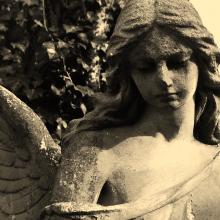
JULIE OWENS had no way of knowing that, within days of saying her marriage vows, she would become a victim of domestic violence. She grew up in a Christian home. Her father was a pastor. Her brother was a pastor. Her uncles were pastors. Her parents had a beautiful and enduring marriage. She was well educated. She was well traveled. And she was deeply in love.
During her honeymoon, Julie quickly realized that her husband now believed he owned her, a belief that would soon be followed by verbal abuse and, toward the end of their marriage, physical abuse.
The abuse began with an irrational jealousy. Then the name-calling began, along with accusations of infidelity. He isolated her from her friends and family. He showed up at the school where she worked as a special education teacher to “check on her.” Later, he started taking the car keys away from her. He even cut the spark-plug wires in their car so that he would always know her whereabouts. He threw dishes at her, disconnected the phone in their rural home, and threatened to harm her, their pets, friends, and even their unborn baby.
Three months into the marriage, Julie knew that his behavior was not normal and the couple separated.
Over the course of the next three months, she went to marriage counseling while her husband went to substance-abuse counseling. In search of help, she spoke with counselors, pastors, and others—yet not one of them ever uttered the words “domestic violence.” Instead, she was told that her husband was dealing negatively with “stress” and that he was “acting out” because he was raised in an abusive family.

IT IS EASY, and a lot more comfortable, to identify and name dysfunction outside your family. It’s an entirely different endeavor, however, to label inappropriate behavior in your own home.
That’s the situation I find myself in as a lifelong member of the black Baptist tradition—one that, by and large, refuses to ordain women ministers and call them into the pastorate. I can no longer keep silent. My spirit won’t let me be quiet about a system where injustice is nurtured.
Women are the backbone of African- American Baptist congregational life, yet they traditionally have been blocked from ordained ministry. I’ve watched this for years in Kentucky where I was born, raised, and currently live; experienced it in other places where I have resided; and heard the same story from Baptist female colleagues in ministry around the country. The same is also true in many white Baptist congregations, such as those affiliated with the Southern Baptist tradition. But I’m speaking here about the world I know personally.
Ironically, some of these black congregations and pastors who are unwilling to honor God’s call on the lives of women seeking ordination are the same ones who are quick to name a plethora of injustices perpetrated against black people as a race, and to demand quick resolution.
Doors for women called to preach the gospel of Jesus Christ have opened a little in recent decades. More women are being licensed, the precursor to ordination in the Baptist structure. But the process usually stops there, and women are left patiently waiting to be blessed into the fold. These “ladies in waiting” are allowed to lead ministries, teach, and occasionally preach, but rarely permitted to go beyond that.

Autumn in Berkeley is not what lovers of changing seasons might recognize as autumn, but it is upon us no less. Days are are shorter. Television programming has changed. The air is a little crisper. The currents in the Pacific have shifted and that great body of water tinkers with our meteorological hopes somewhat differently every day. The leaves don't change so much as drop. And, as usual, there are flowers in bloom.
As someone who loves the northeast coast change of seasons, I find it challenging to unravel my expectations from reality. I find the two so intertwined that I may be tempted to try to change my environment to suit my expectations rather than paying attention to what is actually going on in the world around me.
I am reminded of my neighbors who will be spraying fauxsnow on their windows to celebrate the winter holidays. "It's just not Christmas without snow," some will proclaim. This is an obvious example of what it may look like to insist on our expectations being met all the while our world around us is trying to show us something different. We literally paint the windows to the world around us so we see what we want to see.
We push our environment around and in the process run the risk of missing the grace being offered up in new and rich ways.

Twelve years after falling rubble from the World Trade Center towers destroyed St. Nicholas Greek Orthodox Church, images have been released showing the design for an elaborate new building.
“We want people to feel like this is their house,” said the Rev. Mark Arey, spokesman for the Greek Orthodox Archdiocese of America. “I do believe what Jesus said, ‘My house will be a house of prayer for all people.’ Even though it is a Greek Orthodox church, it will be open to all people of all faiths, a place of solace for them.”
Santiago Calatrava, the renowned Spanish architect who designed the new World Trade Center Transportation Hub, is designing the new St. Nicholas Church, which will include a nondenominational bereavement center as an open place for rest and meditation.
Originally housed in an old row house, the original St. Nicholas Church was a narrow, largely unadorned building. The new designs, however, show a luminous domed building modeled partly on the Hagia Sophia and the Church of the Holy Savior in Chora, both in Istanbul.
The designs had to meet two criteria, Arey said. First, the church had to look like a Greek Orthodox church. Second, it had to fit in with the environment surrounding Ground Zero.

WASHINGTON — In a case that could determine restrictions on expressions of faith in the public square, the Supreme Court on Wednesday will consider religious prayers that convene government meetings.
At issue in Greece v. Galloway is whether such invocations pass constitutional muster, even when government officials are not purposefully proselytizing or discriminating.
Can a town council, for example, open its meetings with prayers invoking Jesus Christ, as happened repeatedly in the town of Greece, N.Y.?
“There’s a whole lot at stake here,” said Ira Lupu, a law professor at George Washington University who specializes in the First Amendment’s religion clauses.
“This case is about first principles: whether the government of a town, acting through its town board, can advance a particular brand of Christianity or any other faith,” said Lupu.
On the other side of the question, Jeff Mateer of the Texas-based Liberty Institute invokes free speech rights and hopes the court will reason that government has no business parsing the words of those who wish to pray in a public forum.

In a world where people are craving inspiration, growth, and information, many churches maintain a cyclical pattern based on redundancy, safety, and closed-mindedness. Unfortunately, many pastors and Christian leaders continue to recycle old spiritual clichés — and sermons — communicating scripture as if it were propaganda instead of life-changing news, and driving away a growing segment of people who find churches ignorant, intolerant, absurd, and irrelevant.
As technology continues to make news and data more accessible, pastors are often failing to realize that they're no longer portrayed as the respected platforms of spiritual authority that they once were.
Instead of embracing dialogue and discussion, many Christian leaders react to this power shift by creating defensive and authoritarian pedestals, where they self-rule and inflict punishment on anyone who disagrees, especially intellectuals.
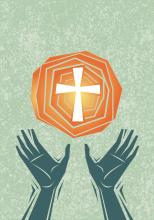
We're all exploring and asking, "What's next?" This particular question serves us well when we ask where our young people are.
"What's next?" and the related, "Who will take us there?"
So, this morning I was primed and ready to read "What Millennials don’t want from the church" by Rachel Sloan. It's a quick and worthy missive in which she says, "The most frustrating part of being a Millennial is that my church does not understand me." What specifically doesn't the church understand? Well, "Millennials (despite the terrible things you are told to believe about us) want real authentic, worship and real, authentic churches. We want churches that want to have a relationship with us."
Having made the same mistake many, many times, this time I decided to get my Millennial friends to chime in on the post. Some rightly reminded me that speaking on behalf of any one generation is an impossible task and presents certain rhetorical problems.

In an evangelical Christian climate obsessed with change, cultural trends, and trying to stay up-to-date and relevant, it's easy to undervalue the elderly. The bestselling authors, the hottest worship bands, the superstar conference speakers, and megachurch pastors are all youngish, or at least certainly not elderly, and they’re mainly marketed towards younger to middle-aged audiences.
In many ways, Christians have suffered from the sin of apathy, being guilty of ignoring a large segment of believers — the elderly — who are continually forced into the shadows of our ministries, leadership structures, publicity campaigns, vision, and dialogue.
In an era where fast-paced technology rules the world, elderly Christians are losing their platforms for communication — and the rest of us are too busy to reach out to them. Social media, blogs, websites, tablets, and smartphones continually shrink access to an elderly population that is unable to keep up — and we aren’t waiting for them.

Skeptics might say that as a perimenopausal woman with a teenage daughter, I’m apt to cry at the slightest provocation, which may be true. But I believe something different happens when we expose our vulnerabilities in a community of faith.
A close friend told me her theory that we are being “seasoned” in church each week, preparing to be broken open in ways we cannot anticipate. So we pray the liturgy, sing the hymns, go through the motions. Yet this seasoning of our spirits prepares us to be tender-hearted, open to prayer working on us.
This makes sense to me. There are so few places where we can bring our raw emotions without a self-conscious need to explain or escape to the nearest bathroom, which happens when we get teary-eyed at work or in line at Home Depot. Perhaps church is one of those last safe havens, where we can cry in public for no reason.

I had the privilege of teaching a pastoral theology class at Seminary of the Southwest in Austin, Texas, last week.
I had the entire senior class: 13 young, promising, enthusiastic, veterans of church wars, and yet eager to get started.
Like any speaker with a full deck of PowerPoint slides, I probably said more than was needed. But I wanted to make, reinforce, clarify, and leave no mistake about my main point: Business as usual is off the table.
After nearly 50 years of relentless decline in mainline churches, business as usual is a sinking ship. The way forward lies in fresh ideas, turnaround strategies, entrepreneurial enthusiasm for risk, and learning from failure.
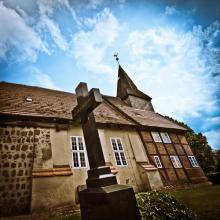
There are few things as exhausting, draining, and disheartening as family drama. I’m not talking low-level sibling rivalry over who gets shotgun all the time. I’m talking deep-rooted family issues that go generations back. That kind of family drama shows up in the most inopportune times in the most inappropriate places — at someone’s wedding or funeral, at the family reunion, or while grocery shopping.
But when family drama shows up in the church, it grieves me. It riles me up like nothing else does because it is in my identity as a Christian and Jesus-follower where I am all of who God created me to be and has called me to be — Asian and American, Korean, female, friend, daughter, wife, mother, sister, aunt, writer, manager, advocate, activist. The church is the place where I and everyone else SHOULD be able to get real and raw and honest to work out the kinks and twists, to name the places of pain and hurt, and to find both healing and full restoration and redemption.
So when the church uses bits and pieces of “my” culture — the way my parents speak English (or the way majority culture people interpret the way my parents speak English) or the way I look (or the way the majority culture would reproduce what they think I look like) – for laughs and giggles, it’s not simply a weak attempt at humor. It’s wrong. It’s hurtful. It’s not honoring. It can start out as “an honest mistake” with “good intentions,” but ignored, it can lead to sin.
Fortunately, there is room for mistakes, apologies, dialogue, learning, and forgiveness.

I love October. As a teacher, it was that time of year where rhythms were becoming established and the seeds of learning were beginning to sprout. In ministry, it is the time where I find myself riding the waves of my student’s school schedules in an effort to connect and converse. In either case, education, shapes not on the schedule of my life but the purpose.
As I breathe in the crisp autumn breeze, it reminds me to consider the larger partnership between the educators and the church. When we, as ministers and church leaders, consider what role education plays in the life of the church, we have to consider the active part of the church in the education of not only the church community, but its larger context.
Education, in the public context, is a constant topic of political struggle and strife. Education, in the ecclesial context, in its best is in-depth Bible study and at its worst is education by osmosis and observation. What is the call or consideration of the church to the topic of education? What role does the church have in the education of the community?
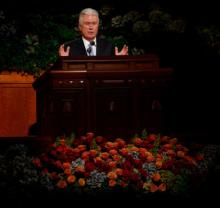
SALT LAKE CITY — It is wrong to assume that Mormons who leave the faith “have been offended or lazy or sinful,” a top leader told members of the Church of Jesus Christ of Latter-day Saints on Saturday during the church’s 183rd Semiannual General Conference.
“It is not that simple,” said Dieter F. Uchtdorf, second counselor in the LDS Church’s governing three-man First Presidency.
Some struggle with “unanswered questions about things that have been done or said in the past,” Uchtdorf explained. “We openly acknowledge that in nearly 200 years of church history — along with an uninterrupted line of inspired, honorable and divine events — there have been some things said and done that could cause people to question.”

THE CELEBRATED PHILOSOPHER Ludwig Wittgenstein used to speak—disapprovingly—of “language going on holiday.” For example, sportswriters often free language from the drudgery of everyday common usage to let it spread its wings in glorious hyperbole about their favorite teams.
Our biblical heritage gives us examples that are much deeper. When we read the prophets especially, we hear language liberated from the constraints of the everyday to give it a sacred vacation, a true “holy-day,” so that it can return to us reinvigorated. We hear them sending language on an adventure holiday into the realm of God’s future. When they receive the words back, the prophets find themselves recounting visions of a new world that God has in store.
Eschatological language that has been to the future and back exerts a powerful authority over us. In this month’s scriptures we experience that authority again in Isaiah’s unforgettable oracles about the holy mountain on which no one shall ever again hurt or destroy. We shall see, with our mind’s eye, the rising of the sun of righteousness with healing in its wings. We shall hear Jesus speaking of the life waiting for the children of the resurrection. The church’s year ends by inviting us to enter under the authority of the coming kingdom, to become fluent in its strange language of hope, harmony, and ultimate reunion with the Holy One who has reconciled all creation through the cross and resurrection.
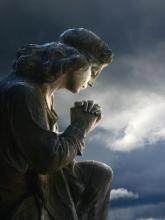
Any right-thinking stranger on our shores must read our daily news and think our nation has gone mad. We have cultivated the ability to end lives quickly; and yet we are continually surprised when our fellow citizens use the tools we have devised for exactly the purpose for which we invented them. Come to think of it, I think we’ve gone mad, too.
But our madness is not one that can be cured by laws alone. Laws can help to restrain us, and can help by making it a little less easy for us to find ourselves armed for murder. But we need something more, something that churches are better equipped to offer than legislatures are.
What we need right now is a richer moral imagination. We need better stories to tell ourselves, stories about the kind of people we could be. We need, more than anything, to learn to help one another to do the hard work of choosing not to pull the trigger.

I’m often asked about what trends I see within Christianity, both good and bad. So in my ongoing effort to help name trends and offer an alternative way of thinking about our faith, here are the five biggest things I’ve seen that tend to keep us from doing our best work as the living, breathing body of Christ in the world today.
1. Church Buildings — Many of our church buildings were established in a time when Christianity was booming numerically in the United States. We could hardly keep up with the growth happening all around us. Understandably, churches popped up where the people were too, drawing many away from their old downtown churches to a more convenient suburban community. But as our numbers have dwindled – combined with the fact the we’re a much more mobile society now that ever before – many churches are becoming monuments to what has long since passed. They have become an albatross rather than an asset.

Once again breaking with traditional Vatican protocol, Pope Francis on Wednesday penned a long letter to the Italian liberal daily La Repubblica to affirm that an “open dialogue free of prejudices” between Christians and atheists is “necessary and precious.”
Francis’ front-page letter was a response to two open letters published in previous months by Eugenio Scalfari, the founder of La Repubblica and an avowed atheist.
The pope’s letter is especially notable for its open and honest assessment of the spiritual state of nonbelievers. And for an institution that long claimed sole jurisdiction on matters of salvation, Francis seems to open the door to the idea that notions of sin, conscience and forgiveness are not the exclusive domain of the Catholic Church.
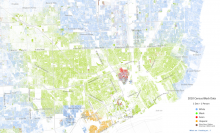
Rev. Dr. Martin Luther King immortalized many phrases still used in the contemporary American lexicon. But it was on Dec. 17, 1963 in a talk at Western Michigan University when he noted that the “most segregated hour in this nation” is 11 a.m. on Sunday.
Though many of King’s other famous quotes come from scripted speeches, the comment above actually was from part of a question-and-answer session with students and faculty about racial integration. He was asked if he believed that true racial integration must be spearheaded by the Christian churches, rather than in workplaces or on college campuses.
Suffice it to say that Dr. King begged to differ, and sadly, his words spoken 50 years ago ring eerily prophetic as we scan the halls of most of our churches. What he claimed then is still, today, a stark reality. He went on in his response:
“I’m sure that if the church had taken a stronger stand all along, we wouldn’t have many of the problems that we have. The first way that the church can repent, the first way that it can move out into the arena of social reform is to remove the yoke of segregation from its own body.”
But how? About the same time King made these keen observations, white people were leaving the inner cities by the millions, establishing more homogenous suburbs on the far boundaries of town. So-called “white flight” took hold, creating entirely new municipalities, while decaying urban centers were hollowed out, left only with an aging infrastructure and those who had no choice but to endure being left to fend for themselves.
As such, our churches were, in some ways, byproducts of the communities in which they found themselves.